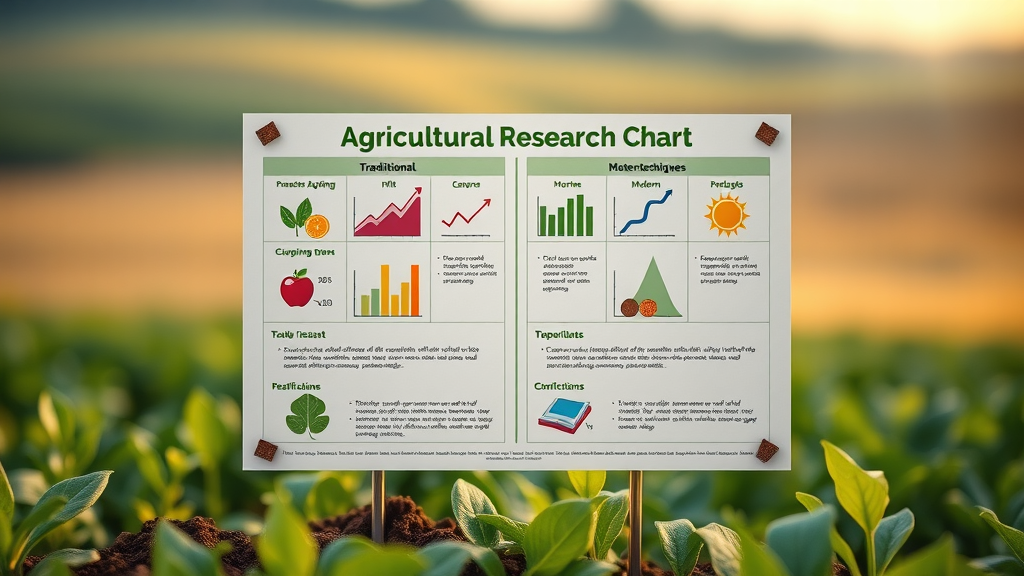In an era where climate change and food security are pressing global challenges, the importance of agricultural research cannot be overstated. It serves as the backbone of innovative strategies that enhance environmental sustainability while meeting the demands of a growing population. "The Role of Agricultural Research in Environmental Sustainability" delves into how cutting-edge research not only protects our planet but also fosters resilience in farming practices. Join us as we explore the transformative power of this research and uncover actionable insights that can lead to a greener, more sustainable future.
What You'll Learn
- Understanding the importance of agricultural research
- Insights into how agricultural research supports environmental sustainability
- Actionable tips for integrating research findings into practice
Introduction to Agricultural Research Importance

Agricultural research plays a pivotal role in shaping sustainable practices that address the environmental challenges of our time. As the global population continues to rise, the demand for food supplies increases, necessitating innovations that can boost productivity while minimizing environmental impact. Agricultural research is crucial in developing new methods and technologies that enhance crop yields, improve soil and water management, and ensure food security.
Overview of Agricultural Research and Environmental Sustainability
Defining Agricultural Research
Agricultural research encompasses a wide range of scientific studies aimed at improving agricultural productivity and sustainability. It involves the study of crop and livestock breeds, pest management, soil and water conservation, and the development of new agricultural technologies. This research is essential for increasing agricultural GDP, reducing poverty, and achieving sustainable development goals.
Linking Agricultural Research to Environmental Sustainability
Joseph Barsky, an agricultural research technician, states, "People don't really understand the work that's involved in keeping a healthy environment and why it's important to them."
Environmental sustainability is deeply connected to agricultural research. By focusing on practices that reduce greenhouse gas emissions and enhance land and water resources, agricultural research helps mitigate the effects of climate change. Furthermore, it supports rural communities by providing them with the tools and knowledge needed to implement sustainable farming systems.
Comparison of Different Agricultural Research Methods
Traditional vs. Modern Research Techniques

Traditional agricultural research methods often rely on observational studies and field experiments, whereas modern techniques incorporate advanced technologies such as genetic engineering, precision farming, and data analytics. These modern approaches enable more precise and efficient research outcomes, helping to meet the growing food demand and improve the supply chain.
The Role of Technology in Agricultural Research
Technology plays an essential role in enhancing agricultural research. Innovations such as drones, sensors, and satellite imagery provide real-time data that can be used to optimize farm management practices. These technologies allow researchers to monitor crop growth, analyze soil health, and track weather patterns, ultimately leading to increased productivity and sustainability.
Pros & Cons of Agricultural Research Approaches
Advantages of Cutting-edge Research
Cutting-edge agricultural research offers numerous benefits, including higher crop yields, improved environmental practices, and better resource management. By utilizing advanced technologies, researchers can develop more resilient crop varieties and sustainable farming techniques, contributing to global food security and environmental protection.
Drawbacks and Challenges
Despite its advantages, agricultural research also faces challenges such as high costs, limited access to technology for small-scale farmers, and ethical concerns related to genetic modification. Overcoming these obstacles requires increased public and private investment, as well as collaboration between research institutions and the agricultural sector.
Expert Insights & Best Practices in Agricultural Research
Joseph Barsky emphasizes, "We like to be involved with people that really have the cutting edge information."
Best Practices for Implementing Research Findings
To effectively implement research findings, it is crucial to engage with local communities and provide them with practical knowledge and technical support. This involves conducting training sessions, workshops, and field demonstrations to showcase the benefits of new technologies and practices. Additionally, fostering partnerships between government agencies, private sectors, and research organizations can facilitate the dissemination of research outcomes.
Common Mistakes & Misconceptions in Agricultural Research
Debunking Popular Myths
One common myth is that agricultural research only benefits large-scale producers. In reality, research aims to improve productivity and sustainability for all farmers, regardless of size. Another misconception is that traditional farming methods are always more sustainable than modern techniques. However, modern methods often offer more precise and efficient solutions to environmental challenges.
Clarifying Misunderstandings
It is essential to understand that agricultural research is not solely focused on increasing crop yields. It also addresses environmental impacts, resource conservation, and social stability. By clarifying these misconceptions, stakeholders can better appreciate the comprehensive benefits of agricultural research.
Actionable Tips for Readers
- How to Apply Research Insights to Enhance Sustainability: Implement sustainable farming practices such as crop rotation, integrated pest management, and water conservation techniques.
- Engaging with Local Research Institutions: Participate in local research programs and collaborate with agricultural experts to stay informed about the latest advancements.
FAQs on Agricultural Research Importance
Why is agricultural research important?
Agricultural research is crucial for developing sustainable farming practices, improving crop yields, and ensuring food security. It helps address environmental challenges and supports economic growth in rural communities.
What is the importance of research in agricultural economics?
Research in agricultural economics provides insights into market trends, policy developments, and the economic impact of agricultural practices. It guides decision-making processes and helps optimize resource allocation for maximum productivity and sustainability.
What is the role of a researcher in agriculture?
A researcher in agriculture conducts studies to develop new technologies, improve crop and livestock management, and enhance environmental sustainability. They collaborate with farmers, policymakers, and other stakeholders to implement innovative solutions.
What is research in agricultural research?
Research in agricultural research involves the systematic study of agricultural practices, technologies, and policies to improve productivity and sustainability. It encompasses various fields such as agronomy, horticulture, and agricultural engineering.
Key Takeaways
- The pivotal role of agricultural research in sustainability: Agricultural research is essential for achieving sustainable development goals and addressing environmental challenges.
- Integration of advanced research methods: Modern technologies and innovative practices enhance the efficiency and effectiveness of agricultural research.
- Actionable strategies for environmental impact: Implementing research findings can lead to significant improvements in resource management and environmental protection.
Conclusion
In conclusion, the importance of agricultural research in promoting environmental sustainability cannot be overstated. By developing innovative solutions and integrating advanced technologies, agricultural research addresses the challenges of climate change, food security, and resource conservation. It is essential for stakeholders to collaborate and invest in research to ensure a sustainable future for agriculture and the environment.
Call to Action
- Explore more about agricultural research and get involved with local initiatives.

For further exploration of agricultural research topics, visit The World Bank Agriculture Overview.
 Add Row
Add Row  Add
Add 




Write A Comment